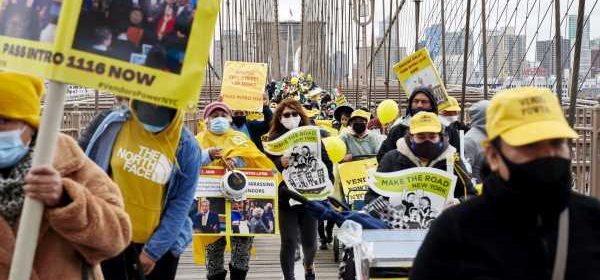NYC Street Vendors Get Overdue Relief With New Permits Bill

In this article
New York City street vendors pummeled by the pandemic scored a rare victory with the passage of legislation lifting decades-old restrictions that have forced thousands of them to operate without a proper license.
The New York City Council this week voted by 34 to 13 in favor of Intro 1116-B. It’s the first major reform for the sector since a 1983 law that limited the number of citywide mobile food licenses to about 3,000, creating lengthy backlogs of applications.
The new bill calls for roughly 4,000 additional permits to be issued in batches of about 400 over a decade, starting in 2022. It also creates an agency dedicated to enforcing vending laws — a change called for by advocates who have denounced ticketing and over-policing.
“Having this permit will change my life in a very important way, because it means that after 20 years of going out to sell tamales everyday and serving my community, my labor will finally be legalized,” said street vendor Sonia Garcia Perez, who spoke through an interpreter at a press conference ahead of the vote. Perez said her name was put on a permit waiting list over 10 years ago.
The bill arrives at aperilous moment for the city’s estimated 20,000 vendors, many of whom are immigrants. Covid-19 has throttled foot traffic and curbed tourism, dissolving the customer base for street food in many parts of the city.
While the changes won’t provide immediate relief from the Covid-19 crisis, the bill will address challenges vendors have faced over the past decades — including being shut out from federal aid during periods of economic crisis because they aren’t operating legally. The new licenses will also help phase out the underground market, where many are paying thousands of dollars a year to rent permits.
“This legislation will bring hope and opportunity to hardworking New Yorkers who are immigrants, who have been historically left out of a lot of the government’s support,” said Margaret Chin, a Manhattan Democrat who championed the bill.
Opponents said it doesn’t address challenges faced by traditional retailers at a time when small restaurants and other businesses have been hit by activity restrictions.
“There’s no question that street vendors play a vital role in our city, but so do locally owned brick-and-mortar businesses,” said Mark Gjonaj, a Bronx Democrat who voted against the bill. “Unfortunately this legislation unnecessarily pits one against the other. I do not doubt the intent of the bill, but there is an honest disagreement about the impact that this legislation will have on our struggling small businesses, of which many are women, minority, and immigrant owned.”
Mayor Bill de Blasio supports the bill. He said at a Jan. 25 press conference that it was something he’d wanted to see for a long time.
There’s still more work to be done for vendors, according to Matthew Shapiro, legal director for the Street Vendor Project, part of the nonprofit Urban Justice Center.
The pandemic has changed the look of the city’s sidewalks over the summer, with new regulations allowing restaurants to get creative with heated outdoor seating under tents and yurts. Vendors haven’t been granted the same flexibility, according to Shapiro.
“Vendors have often struggled for space because there are so many regulations about where they can and cannot be,” Shapiro said. “It’s time also for reform of the regulations that govern where vendors can and cannot set up.”
— With assistance by Natasha Abellard
Source: Read Full Article
